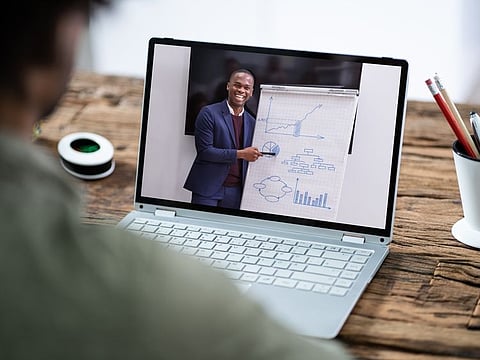The e-learning curve
With remote learning plans preponed, what will post-pandemic education look like?

Just five months ago, before the coronavirus was a household name, it would have been inconceivable for students, their parents and teachers to imagine what the world would look like today. With schools and universities closing doors for the foreseeable future, educational institutions have had to dramatically speed up their remote learning initiatives and come to grips with a range of new technologies, whether for instruction, collaboration or testing of knowledge.
Tech companies are queuing up to fulfil their needs. HP is in the mix, as part of its mission to enable better learning outcomes for 100 million people by 2025. “Towards this objective we support many education and ICT ministries in the Middle East and Africa through our education-focused programmes – Classroom of the Future, HP Learning Studios, HP LIFE, HP Teaching Fellows, Digital School Awards, NETA (National Education Technology Assessment) and the recent addition, BeOnline,” explains Mayank Dhingra, who leads HP’s Education and Business vertical in the Middle East and Africa.
“Our programmes focus on digital pedagogy, improving learning outcomes, providing business and IT skills, professional teacher development, analysing technology impact and enabling remote learning. We help schools in creating a blended pedagogy approach and in implementing the Flipped Classroom concept.”
We help schools in creating a blended pedagogy approach and in implementing the Flipped Classroom concept.

Plans pushed forward
Prior to Covid-19, the UAE Ministry of Education had been working with Microsoft to launch twice-weekly virtual learning initiatives on the Redmond-based company’s Teams platform in September of this year. However, the virus and enforced physical distancing accelerated the pace of the programme, and it went live on March 22 instead. “The programme aims to enhance safety for students and society at large, as a set of precautionary and preventive measures with the ongoing challenges yet ensuring smooth flow and completion of the curriculums,” a Microsoft spokesperson tells GN Focus.
For Google, another tech giant involved in e-learning through its Teach from Home and YouTube Learning Destination tools, there will be a long-term impact arising from the use of these new tools. “While distance learning is highly unlikely to replace the need for physical classrooms, it’s likely that the current situation will result in the continued use of technology in classrooms (both physical and virtual) at a greater scale than before,” explains Tarek Khalil, Head of Google Cloud Middle East and North Africa, adding that these tools improve administrative efficiency and create new means of collaboration, while allowing teachers to prioritise giving students differentiated feedback and focus more on coaching and guidance than delivering instructional content.
While distance learning is highly unlikely to replace the need for physical classrooms, it’s likely that the current situation will result in the continued use of technology in classrooms (both physical and virtual) at a greater scale than before

Blended learning
Sam Tayan, Zoom Video Communications’ Gulf representative, says e-learning isn’t about technology – it’s about learning, using technology. “E-learning can combine several different delivery methods including web-based courses, collaboration software and video conferencing. E-learning can also mix various event-based activities including face-to-face classrooms, self-paced learning and live e-learning using video conferencing.
“Producing learning content is time-consuming, whether for online or classrooms. With e-learning, each time a course is accessed the return on investment improves, since the production costs are divided by the number of users. There is also the cost of building space, utilities and teacher salaries to consider. Using one teacher and holding a class using video conferencing results in reaching students in classrooms, at distant sites and at home for a much lower cost.”
Producing learning content is time-consuming, whether for online or classrooms. With e-learning, each time a course is accessed the return on investment improves, since the production costs are divided by the number of users.Sam Tayan, Zoom representative, Gulf
Implementation
Speaking at Dell’s Harness Your Digital Future virtual summit earlier this week, Chris Krestas, Senior Systems Engineer and Edtech lead, said, “We are educating our children and we are receiving higher education in a completely different way than we used to do before. And that happened over very few weeks, which is surprisingly fast.” He cites a number of challenges unique to e-learning over its traditional counterpart, the first of which is security — students are using their own devices and networks to access materials from a range of online sources, something that is far easier to secure in the confines of a classroom. “IT needs to be transformed, it needs to be automated and modernised to have a new kind of services that people can consume from anywhere and everywhere. This also puts a lot of pressure on the traditional processes.”
IT needs to be transformed, it needs to be automated and modernised to have a new kind of services that people can consume from anywhere and everywhere. This also puts a lot of pressure on the traditional processes.

Saleh Lafi, Founder of The Study Room, a Dubai-based online tutoring platform that uses Zoom, believes that one consequence of the pandemic and its impact on education will be a long-term behavioural change in the way people learn and teach. “Once the pandemic is over, we expect that online education will be incorporated consistently in both schools and universities. We also believe that people will have found an interest in online learning due to the fact that it produces the same result, at a larger convenience. In addition, we continue to observe the governmental opinion on online education, which we think will greatly impact the future of online education in the UAE.”
"We continue to observe the governmental opinion on online education, which we think will greatly impact the future of online education in the UAE."




